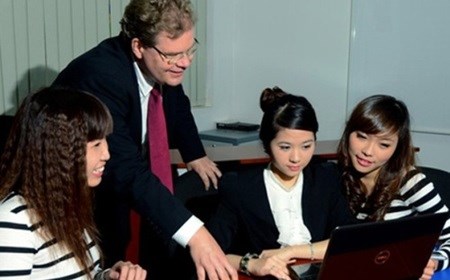Expats with degrees forego work permits
Foreigners with bachelor's degrees and at least three years of experience working in their respective fields are no longer required to obtain work permits in Viet Nam, according to a decree approved by Prime Minister Nguyen Tan Dung.
The decree contains implementation guidelines for some items related to the management of foreign employees under the Law on Employment.
Under the new decree which was released on February 10, a foreigner who has proved to work as an expert, manager, executive director or technician for foreign enterprises, is also eligible to work in Viet Nam without a work permit.
 |
| Foreigners with bachelor's degrees and at least three years of experience working in their respective fields are no longer required to obtain work permits in Viet Nam. (Photo: vneconomy.vn) |
Additionally, foreign employees who transfer to Viet Nam from the same enterprise abroad in the service sectors of business, information, construction, distribution, education, environment, finance, health, tourism, culture and entertainment, and transportation services are permitted to work without a working licence.
In the context of AEC establishment, which allows a free flow of labourers within Asia, Viet Nam is expected to be an attractive destination for investment projects and highly qualified foreign employees, said Ha Thi Minh Duc, Deputy Director General of the Ministry of Labour, Invalids and Social Affairs' Department of International Cooperation, during a conference in Ha Noi last month.
Deputy Head of MoLISA's Employment Department Le Quang Trung said some Vietnamese employees may find it difficult to compete with foreign employees, and thus a legal framework to protect domestic employees and providing them with more benefits in accordance with international agreements should be taken into account.
While domestic employees need to improve their competency, the Government also needs to enact a policy to protect Vietnamese employees by stipulating a language requirement for foreign employees, said Trung.
"There should be a regulation stipulating that foreign employees must be able to speak Vietnamese to be allowed to work in Vietnam," said Deputy General Head of MoLISA's Social Insurance Thai Phuc Thanh.
The Department of Labour, Invalids and Social Affairs has implemented measures to manage expats working in Vietnam, including administrative procedures on granting working permits, an online expat management system and a pilot programme of re-granting working permits through online means.
There were more than 76,000 foreign employees of 74 nationalities in Viet Nam in 2014. Among these, 58 percent were Asian and 29 percent were European employees, according to MoLISA.
According to the Expat Explorer survey conducted by HSBC in late December 2015, Viet Nam is regarded as the most attractive country in Asia for expats.
About 68 percent of the 22,000 survey participants working in Viet Nam – foreign employees from all over the world - said they could save more money working in Viet Nam.
(Source: VNA)




